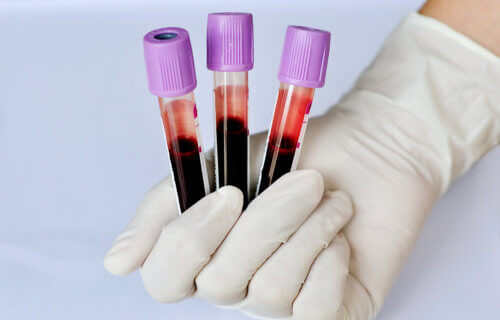BARCELONA, Spain — A routine test may be able to detect whether certain cancer patients are at high risk of developing additional blood cancers, new research reveals.
Scientists at Institut Gustave Roussy, a leading cancer research hospital in France, say blood samples — or liquid biopsies — can identify this greater risk. Prior research shows that tumors shed DNA into the blood, creating cell-free DNA (cfDNA).
Instead of invasive biopsies, blood samples are currently used to identify cfDNA which can allow doctors to better characterize the cancer, select the best therapy, and monitor how the disease is progressing.
A condition called clonal hematopoiesis (CH) is commonly found in blood samples and paved the way for even more diagnostic possibilities. Normally, hematopoietic stem cells create other blood cells from the bone marrow.
However, CH occurs when a hematopoietic stem cell starts creating other stem cells with a different genetic pattern to normal blood cells. The cells can then shed DNA into the blood and previous research shows there is a one percent chance CH will progress to blood cancer each year.
As a result, a team at Gustave Roussy wondered if the blood samples could help identify patients who have developed blood cancer or are likely to do so. They tested the biopsies for myelodysplastic syndrome and acute myeloid leukemia.
Myelodysplastic syndrome is a blood disorder originating in bone marrow, and it can develop into white blood cell cancer acute myeloid leukemia. The researchers believed when a blood sample revealed high-risk CH, doctors should study the blood to identify the likelihood it will become blood cancer, or whether it has already turned into blood cancer.
How successful can a simple blood test be?
Consequently, they took blood samples from 1,416 patients with a range of solid tumors if they enrolled in the Gustave Roussy Cancer Profiling study (STING).
“We found that 113 patients, 8%, had at least one clonal hematopoiesis mutation that could be considered to place them at higher risk of developing blood cancers during their life. Out of these patients, 45 were referred to our hematology unit by their oncologist and five were subsequently diagnosed with blood cancer: one with myelomonocytic leukemia, two with myelodysplastic syndrome and two with essential thrombocythemia,” says Dr. Marco Tagliamento, a research fellow at the Institut Gustave Roussy in France, in a media release.
“Early detection could prevent complications during anti-cancer treatments, for instance alterations to blood counts, and consequent interruption or delay to treatment. It could also indicate possible diagnostic and therapeutic pathways for doctors to consider for hematological disease,” Dr. Tagliamento adds.
The Gustave Roussy Molecular Tumor Board carefully selected each case for the study.
“Case-by-case evaluation is crucial,” Dr. Tagliamento continues. “Different aspects must be considered when evaluating the potential impact and management of high-risk clonal haematopoiesis in patients who already have cancer. These relate, for example, to the patients, their medical history and to the underlying cancers. All of them should be part of a balanced evaluation made for each individual case.”
“We will continue to apply this approach within the Gustave Roussy Molecular Tumor Board. We want to implement and improve the efficiency of the algorithm to select patients with solid cancers who could benefit from a hematological evaluation. These results are part of a team project led by Dr Mihaela Aldea and Dr Jean Baptiste Micol.”
Certain mutations reveal a higher cancer risk
Researchers presented the findings at the 34th EORTC-NCI-AACR Symposium on Molecular Targets and Cancer Therapeutics in Barcelona, Spain.
“This is well-conducted research that reveals an additional facet to the information gained from liquid biopsies. Dr Tagliamento is right to stress the importance of evaluating the context for each individual patient. Cancer patients have much to worry about, and so their doctors need to take into account the patient’s clinical situation and their treatment plan. Patients’ anxieties mean that it will not always be appropriate to highlight a potential increased risk of developing an additional blood cancer in later years,” says Professor Ruth Plummer from Newcastle University, the chair of the 34th EORTC-NCI-AACR Symposium, who did not take part in the research.
“Only some specific clonal hematopoiesis mutations are likely to predict a higher risk of blood cancer developing at some point in the future. This study suggests patients with these mutations should be referred for further evaluation and even then, decisions about what would be best for these patients will depend on a range of other factors.”
South West News Service writer Pol Allingham contributed to this report.

